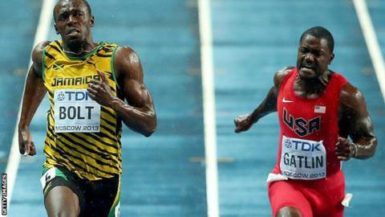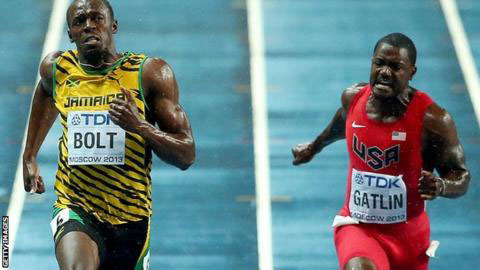RIO DE JANEIRO, (Reuters) – Always the crown jewel in the Olympic athletics programme, the Rio 100 metres final is shaping up to be extraordinary for many reasons.
When Usain Bolt and company enter the Olympic stadium tomorrow, this will be it. The last Olympic 100 metres final for the greatest sprinter the sport has known. With victory, Jamaican Bolt would become the first man to win three consecutive 100 metres titles at the Games. Carl Lewis (1984 and 1988) and fellow American Archie Hahn (1904 and 1906) share the current mark with two each.
Yet, the lanky Bolt is not the only one looking for a place in history.
American rival Justin Gatlin, at the age of 34, would make a mark of his own with a podium finish. No man that old has ever medalled in an Olympic 100 metres final.
Britain’s Linford Christie holds the honour at present, snatching gold at the 1992 Barcelona Games at age of 32.
“It’s a very old competition with Bolt and Gatlin,” Olympic historian Bill Mallon told Reuters in an email.

“Some young guys are coming up with (American) Trayvon Bromell and (Canadian) Andre de Grasse, but I don’t see them challenging the old guys quite yet.”
While a Bolt triumph for the third consecutive Games would be a major accomplishment, it would not in the mind of Mallon push the Jamaican to the top of Olympic athletics achievements.
“(He’s) still behind Lewis’s long jumps and (American compatriot Al) Oerter’s discus throws,” Mallon said.
Both won four consecutive Olympic titles in the same event. “If he (Bolt) does the triple gold again (100-200-4×100 relay), that would be at the very top of athletics Olympics achievements,” said Mallon. A third consecutive triple would also tie Bolt with legendary Finnish long-distance runner Paavo Nurmi and Lewis as leaders in athletics Olympic gold medals with nine each. That both Bolt and Gatlin are still running at such a high level is unusual and not just because of their age. Gatlin, the 2004 Olympic champion, was totally out of the sport for four years while serving a second doping ban.
Yet the American is the fastest in the world this year at 9.80 seconds.
Because of his doping past, not everyone believes he should even be in the sport. However, he is fully eligible to compete under International Association of Athletics Federations (IAAF) rules.
The soon to be 30-year-old Bolt’s physique contributes to his unusualness.
Before the Jamaican and coach Glen Mills figured out a way to squeeze the 1.96 metres runner and his lanky legs into the starting blocks, few thought a sprinter that tall could be a success in the 100 metres. Eight world records, six Olympic gold medals and 11 total world titles prove the doubters wrong.
By comparison, Gatlin, a one-time hurdler, has one Olympic gold and two world titles stretching back to 2005.
He has become even faster since returning from his four-year doping ban in 2010, and in 2013 handed Bolt his only loss in their eighth 100 metres meetings.
But he is unlikely to cause another upset.
A demoralising loss to Bolt at the 2015 world championships when Gatlin was clearly in better shape no doubt weighs heavily on the American.
If you believe in tell-tell signs, just check the colour of the track at the Rio Olympic stadium.
It is blue, the same colour as the Berlin oval where Bolt delivered his last world record.

